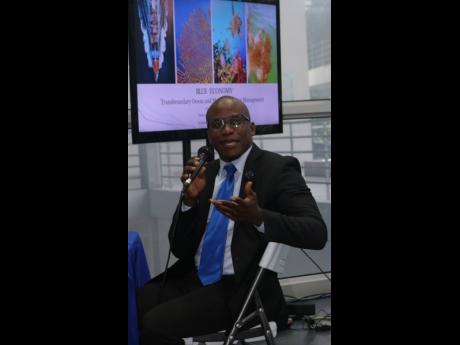Life below water critical to survival on land
Failure to sustainably manage and exploit the marine ecosystems of the oceans could spell economic disaster for regional states, Director of Planning, Evaluation & Monitoring at the Caribbean Maritime University Dr Andrew Edie has warned.
“Healthy oceans and marine ecosystems underpin the ocean economy and provide critical life support functions upon which human health and wellbeing depend. The ‘blue economy’ is an opportunity for the Caribbean region and developing states alike to better harness and sustain the natural endowments of their Blue resources to aid in national development and to fulfil their SDG 14 goal,” he told the recent International Workshop on Sustainable Blue Economies in Jamaica and the Caribbean held at the faculties of Medical Sciences at The University of the West Indies Mona campus.
The SDG 14 goal refers to one of 17 Sustainable Development Goals, also known as the Global Goals, which were adopted by the United Nations in 2015 as a universal call to action to end poverty, protect the planet, and ensure that by 2030 all people enjoy peace and prosperity. SDG 14 is about ‘Life below water’ and speaks to conservation and sustainable use of the oceans, seas, and marine resources for sustainable development. It seeks to protect and ensure the sustainable use of oceans by among other things, reducing marine pollution and ocean acidification, ending overfishing and conserving marine and coastal ecosystems.
Offering a snapshot of the oceans, which, if it were a country, would have the seventh largest economy in the world, Edie gave a snapshot of the economic potential of the seas which he declared accounts for US$1.5 trillion of global gross value-added economic activities each year.
“Among the many benefits, the eradication of poverty is one of the things we want to tackle … and 80 per cent of global trade by volume is carried by the sea; 350 million jobs worldwide are linked to fisheries; 34 per cent of food oil production will come from offshore fields by 2025 and 50 per cent of fish for human consumption is provided by aquaculture.”
Meanwhile, in her address to the launch of the Multi-Agency Fisheries Crime Coordinating Mechanism last December, UNDP Resident Representative for Jamaica Denise Antonio described the ocean as a storehouse of riches which if harvested in a sustainable way could provide an endless supply of food, medicine, minerals, jobs, products and livelihoods. This, as the World Bank estimates that the blue economy contributes three to six trillion United States dollars to the global economy each year.
And with trade via ocean expected to double by 2030 and expected to quadruple by 2050, there is an urgent need for all humans to ensure that they oceans are protected since they have an integral role in ensuring our collective survivability, according to Edie.
The workshop was hosted by the University of the West Indies, Mona in collaboration with New Leaf Power & Conservation Solutions Ltd and the Ocean Policy Research Institute of the Sasakawa Peace Foundation.

